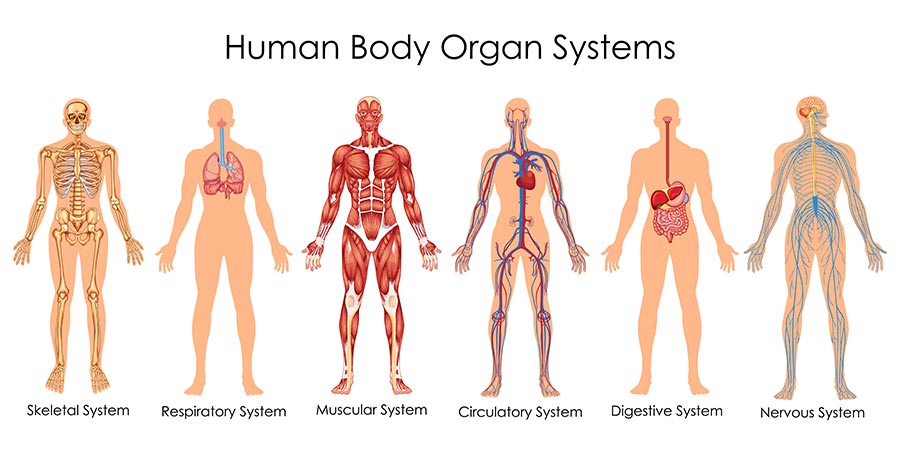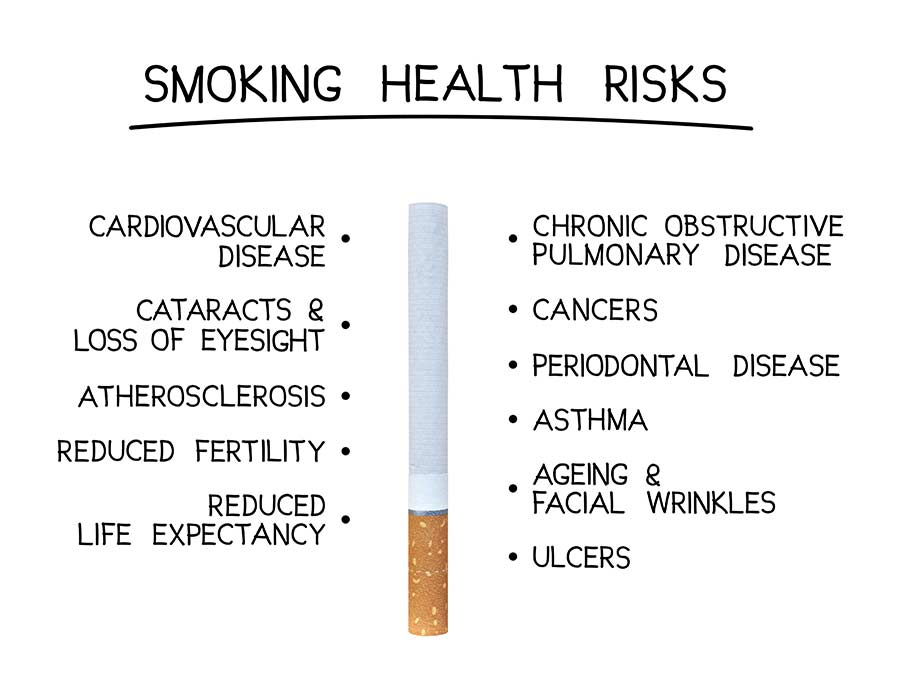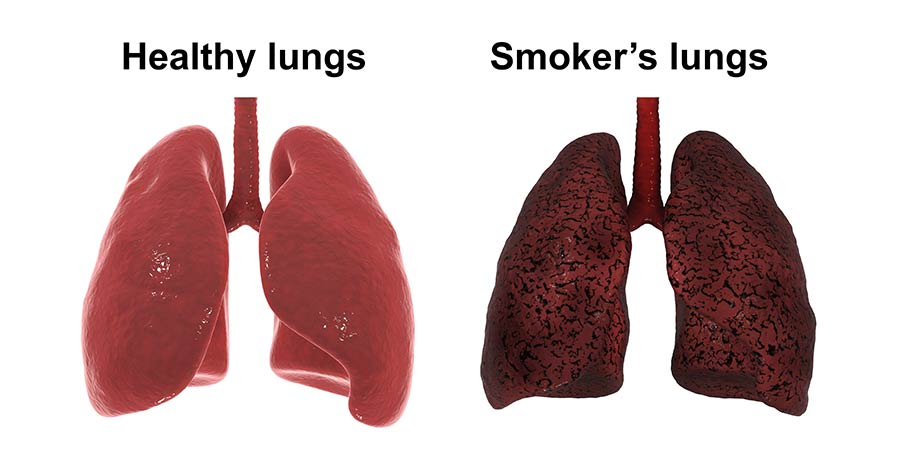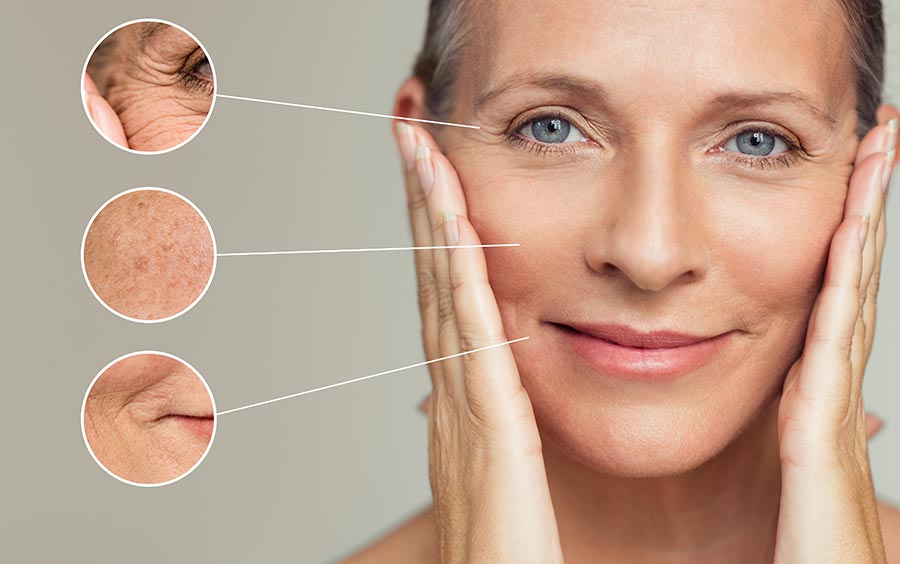Smoking is bad for your health. You know that already. But you may not know all the short-term and long term effects of smoking on your body.
So why is smoking bad for you?
Some of the effects of smoking are obvious: bad breath, coughing, dulling of your senses of taste and smell. Others show up with time: yellowed teeth, shortness of breath, dull skin and wrinkles.
But a lot of the damage can’t be seen or felt easily. Or it may not be obvious that it’s caused by your smoking habit.
For instance, we all know that smoking is harmful to our lungs. But did you know that it’s harmful to other parts of your body, too? Heart, blood vessels, skin, bones, brain, eyes, immune system, mouth and throat–all suffer from smoking. In fact, smoking harms almost every part of your body!
Effects of Smoking on Your Body and Health
Short-Term Effects of Smoking
The short-term effects of tobacco include:
- Bad breath
- Momentary stimulation followed by state of withdrawal and reduced brain activity
- Fatigue and dizziness
- Dulling the senses of taste and smell
- Coughing
- Shortness of breath
- Increased blood pressure
- Increased heart rate
- Decreased blood flow
- Nausea
- Headaches
Long-Term Effects of Smoking
There have been a lot of studies of smokers’ health and scientists have discovered a wide range of diseases and harmful long-term effects of tobacco on our bodies.

Below is a list of all the diseases caused by smoking:
- Reduces life expectancy
According to the Centers for Disease Control (CDC), cigarette smoking causes over 480,000 deaths a year in the U.S.
You’re probably not surprised that heavy smokers have a shorter life expectancy. But it’s not just heavy smokers who are at risk. People who smoke only 4 or fewer cigarettes a day can experience the negative effects of smoking and they still have a greater risk of premature death than nonsmokers!
- Asthma
If you have asthma, smoking can trigger an attack or make it worse.

- Tuberculosis
If you’ve had tuberculosis, smoking doubles your chance of a recurrence.
- Respiratory and lung problems like COPD and emphysema
You can get lung disease from smoking. With time, you can develop chronic obstructive pulmonary disease (COPD) or emphysema that makes it hard, and painful, to breathe.
- Heart Disease
Heart disease is often related to smoking. In fact, smokers are four times more likely to develop heart disease than nonsmokers.
- Stroke
Strokes can occur, too. The risk of stroke is doubled for smokers.
- Vascular Dementia
Vascular dementia is a risk. If Alzheimer’s disease develops, it progresses more quickly in smokers than in nonsmokers.
- Rheumatoid arthritis can develop
- Crohn’s disease. Smokers are more likely to develop Crohn’s disease.
- Diabetes
Diabetes is much more common in smokers than in nonsmokers, and it’s harder to control. Some people with diabetes develop an eye disorder called diabetic retinopathy, which can lead to loss of vision.
- Cancer
Cancer is one of the most feared smoking effects. Below are some of the body areas where smoking-related cancers can occur:
- Lung cancer
- Bladder cancer
- Blood cancer (in the form of leukemia)
- Cervix cancer
- Colon and rectum cancer
- Esophagus cancer
- Breast Cancer
- Kidney cancer
- Larynx cancer
- Liver cancer
- Pancreas cancer
- Stomach cancer
- Throat and tongue v
- Tonsils cancer
- Trachea cancer
- Eye Problems
Smoking can cause other eye problems, too. Cataracts, macular degeneration, dry eye and glaucoma are a few of them.
- Weaker immune system
A body with a weak immune system leads to slower healing wounds and increases likelihood of infection and illness.
- Erectile dysfunction
Obstructed blood flow due to smoking can also cause erectile dysfunction and impotence.
Other side effects of smoking cigarettes include:
- Fertility problems
- Increased risk of miscarriage
- Early menopause
- Menstrual problems
- Complete loss of sense of smell and taste
- Yellow teeth, tooth decay and bad breath
- Stomach ulcers
- Grey appearance
- Early wrinkles
- Back pain
- increased susceptibility to infection

What Does Smoking Do to Your Body? A Closer Look to the Most Common Long Term Effects of Smoking
Cancer
There are a lot of chemicals in cigarettes, and some of them combine to form harmful chemical compounds. You inhale those compounds when you smoke, and the people around you breathe them in when they breathe in your smoke.
Some of those compounds are known to cause cancer. You probably know that smoking can cause lung cancer. It can cause a lot of other cancers too, such as blood, throat, stomach, bladder, colon, kidney, breast and pancreatic cancer.
And smokers who develop cancer are more likely to die from it than nonsmokers.
What Does Smoking Do to Your Lungs?
The smoke you inhale irritates and inflames your lungs. The cells in your air passages make more mucus in response. Smoke also damages the small hairs, called cilia, that line the airways. The cilia act to move mucus upwards, towards the throat, so you can cough it up or spit it out.
But when you’re a smoker, there’s more mucus, and it’s thicker than usual. The cilia are damaged, and they move more slowly than usual. That’s not a good combination.
What smoking does to your lungs is that it makes it very hard to rid your lungs of mucus. Not only does that make you cough, it also makes it more likely that you’ll come down with a respiratory infection.
And it’s more difficult to get enough oxygen. There are clusters of small air sacs called alveoli in your lungs. Oxygen passes into the alveoli, and carbon dioxide passes out.
The alveoli inflate and deflate as you breathe in and out. But in smokers lungs, the alveoli become less flexible. Some rupture. It becomes more difficult to exchange oxygen and carbon dioxide.
This is how smokers lungs look like in comparison to non-smokers lungs

Circulation
One of the most common health effects of smoking is that it damages the very small blood vessels in your lungs. They’re called capillaries. Each of the alveoli is surrounded by capillaries.
Oxygen and carbon dioxide pass through the walls of the alveoli, and then through the walls of the capillaries and into the bloodstream.
When you’re a chronic smoker, the walls of the capillaries become thicker, making it much harder for oxygen to pass through them and into your bloodstream.
The walls of other blood vessels become thicker, too. That makes them narrower, and it makes it more difficult for your heart to pump blood through them.
Peripheral arterial disease–PAD–can develop, due to the reduced blood flood to the legs and arms.
How does smoking affect your heart?
If you’re a smoker, your heart doesn’t get as much oxygen as it needs. It has to pump harder and faster to supply blood through your narrowed blood vessels. As a result, your blood pressure goes up.
The tar in cigarettes can cause plaque to build up in your blood vessels. Blood flow is restricted, your blood becomes thicker and blood clots can develop. You can have a heart attack or a stroke.
You can also develop an aortic aneurysm. It’s a bulge in the abdominal portion of the large artery carrying blood from your heart. If the aneurysm ruptures, it’s likely to be fatal.
Effects of Smoking on Your Skin
Smoking tobacco affects your skin, too. The decrease in blood flow means that your skin isn’t receiving as much oxygen and as many nutrients as it needs to stay healthy. It can begin to look gray and dull.
Some of the chemicals in cigarette smoke damage collagen and elastin. They’re important for your skin’s strength and elasticity. When they’re damaged, your skin begins to sag and wrinkles become deeper.
Vertical wrinkles form around your mouth. That’s partly because of the collagen and elastin loss, but it’s also because of that pucker you do when you hold a cigarette between your lips.
And squinting to keep smoke out of your eyes encourages formation of crow’s feet–those wrinkles around the outer side of the eyes.

Bones
Your bones also suffer when you smoke. You’re more likely to develop osteoporosis–a decrease in bone density. If you do, your bones become weaker and break more easily. And they heal more slowly after a fracture.
How Smoking Cigarettes Affects the Brain
Smoking damages your brain, too. Amongst the dangers of smoking is that the cerebral cortex becomes thinner in smokers. The cerebral cortex is the part of the brain essential for memory and learning.
So the changes that normally come with aging seem to develop earlier in smokers.
Eyes
Even your eyes can be damaged by smoking. Smokers have a greater chance of developing cataracts–clouding of the lens of the eye–than nonsmokers.
Smokers who develop diabetes can develop an eye disorder called diabetic retinopathy. The small blood vessels in the retina of the eye become damaged or blocked, affecting vision.
And diabetes or high blood blood pressure–both common in heavy smokers–mean that you’re more likely to develop glaucoma. It’s an increased pressure within the eye that can lead to loss of vision.
Age-related macular degeneration is a risk, too. It’s a eye disease that starts with blurring in the center of the field of vision. It worsens with time, limiting vision even further. And it’s a risk even for people who breathe in your secondhand smoke!
Immune System
Smoking causes inflammation throughout the body. It weakens the immune system, and it becomes harder to fight off infections and diseases. So smoking poses even more health risks by weakening your immune system.
Mouth and Throat
The effects of smoking on your mouth and throat are numerous. You’ve probably noticed that people who have been smoking for a long time often have discolored teeth. Most of the times, they also have gum disease.
Your gums can become swollen and sensitive and bleed easily. Your teeth can become loose, too. And if you have any dental procedures–oral surgery or a tooth extraction, for example–healing can be slower and more difficult.
If you smoke, or use tobacco in any other form, you have a high risk of developing oral cancers. Cigarette, cigar or pipe smoking can lead to cancer of the mouth or throat, while chewing tobacco can lead to cancer of the lips, gums or cheeks.
Effects of Smoking on Pregnancy
If you smoke, you may have trouble becoming pregnant. And if your partner smokes, he may have problems with erectile dysfunction. If he’s a heavy smoker, he may have a low sperm count and low sperm motility. So both men and women who are smokers may have reduced fertility.
If you’re pregnant, or thinking about becoming pregnant, it’s important to know that smoking can harm your baby. And that harm starts while it’s still in the womb.

The chemical you inhale in cigarette smoke can pass through the placenta and umbilical cord to your baby. And the amount of oxygen your baby gets–and needs–can be reduced if you smoke.
Your baby’s lungs and brain may not form properly. A cleft palate and other defects of the mouth or lips could develop.
Smoking during pregnancy makes it more likely that your baby will be born preterm, and that he or she will have a low birth weight. Preterm and low birth weight babies can have a wide variety of medical and developmental difficulties, both in infancy and later in life.
There’s also a risk of sudden infant death syndrome–SIDS. And that risk is increased if your baby breathes in secondhand smoke, either from you or from someone else.
Secondhand smoke is dangerous for your baby in other ways, too. He or she can develop asthma, bronchitis, pneumonia or ear infections.
How Your Health Improves After You Quit Smoking
Discovering all the harmful consequences of smopking may seem really discouraging. There’s some good news, though.
If you quit smoking, your health will improve. And those improvements will begin very quickly.

Your health starts improving as soon as 20 minutes after you stop smoking.
Your elevated pulse rate and blood pressure will return to normal. The tissues in your body will start to receive more oxygen.
You’ll start to feel the difference in your ability to breathe more easily. With time, even your risk of cancer will decrease.
What happens when you stop smoking.
The risk of cardiovascular disease, cancer and lung diseases declines after quitting smoking.
Most doctors will tell you that quitting smoking is the single most important action you can take to improve your health. Isn’t it time for you to quit?


